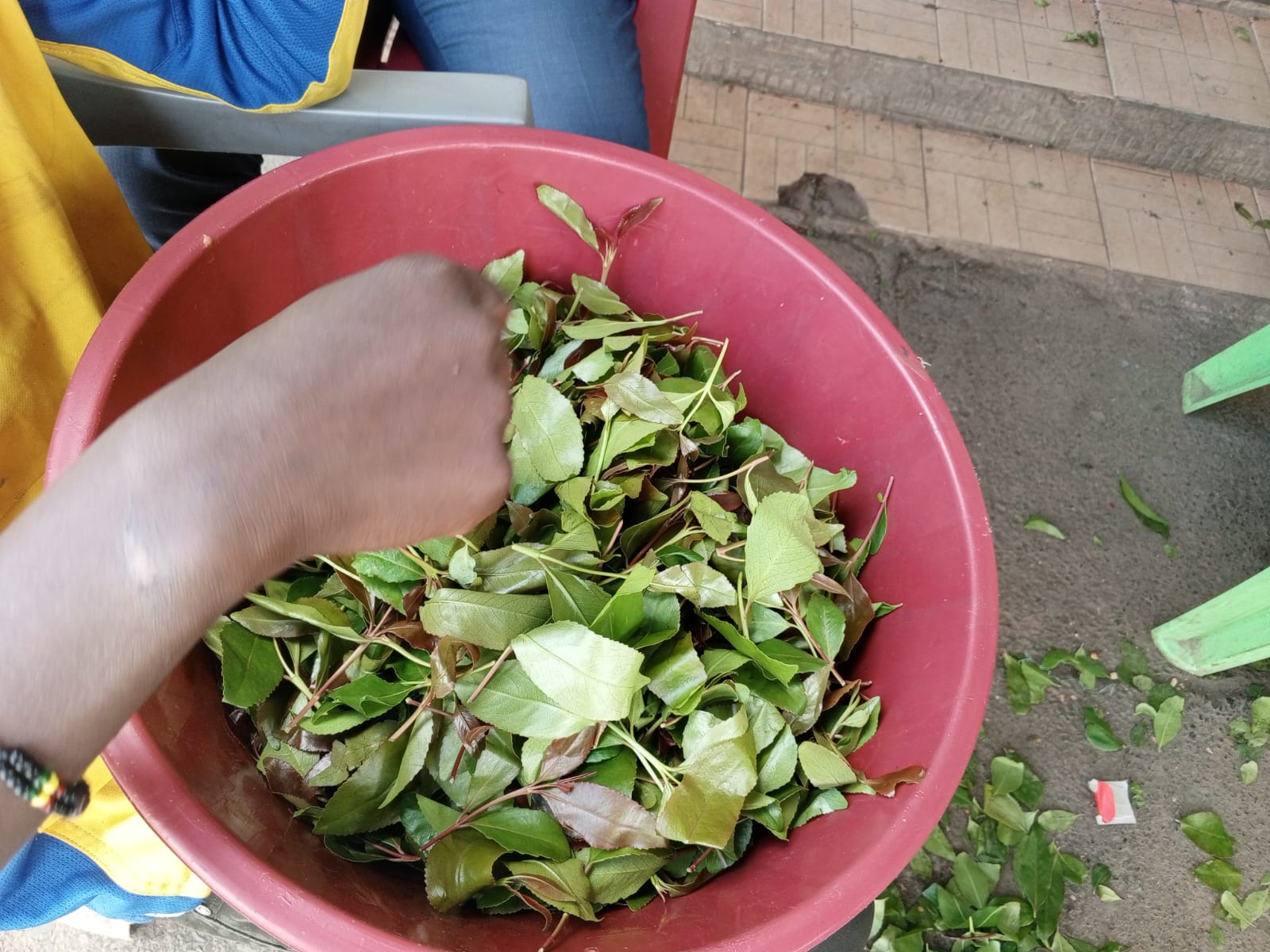Eastleigh's 'Jaba Base': Rising trend of Miraa, Muguka chewing despite health risks

According to a report by the National Authority for the Campaign Against Alcohol and Drug Abuse (Nacada) in 2023, Miraa and Muguka were listed as drugs and the most commonly abused substances by Kenyans aged 15-65 years.
Mombasa and Kilifi counties have enacted a stringent law banning the entry, transportation, distribution, sale, and use of Muguka and its products, citing adverse health effects to youth.
The two counties are fighting drug abuse in the region but Miraa has been spared. "We have no issue with people bringing and selling Miraa in our county, but when it comes to Muguka in Kilifi County, I will enforce a ban, no matter the circumstances,” Governor Gideon Mungaro said on Friday.
More To Read
- Eastleigh bustles with Christmas shoppers as holiday season kicks off early
- Tatu City hosts Muslim business community to explore new investment opportunities
- CS Kagwe announces policy overhaul for sugar, tea and miraa to protect farmers’ earnings
- Kenya exports up to 17 tonnes of miraa daily to Somalia, government confirms
- Mutua sounds alarm as drug abuse blocks coast youth from lucrative jobs abroad
- How community initiative is reviving Eastleigh’s cricket legacy
However, back in Nairobi's Eastleigh area, "Miraa and Muguka," or "Jaba Base" as the youth call it, is a popular hangout spot. Here, young and old people gather for hours, socialising while chewing Miraa and Muguka.
Miraa, also known as khat, is a traditional stimulant, but its high-cost forces many to turn to Muguka, a more affordable alternative.
Miraa consists of stems, sold in varying sizes based on quality, with prices ranging from Sh400 to Sh1,000. Muguka, on the other hand, is derived from the leaves of the Miraa plant and is much cheaper, often available for as little as Sh50.
Samuel Omondi, a 22-year-old water vendor in Eastleigh, turned to Muguka to avoid using drugs. "I was afraid of alcohol and other drugs, but I was drawn to Muguka because many of my peers were using it. It has helped me cope with my hard job and the stresses of life. When you chew Muguka, you feel good, and that's why I do it constantly," said Omondi.
Omondi admits that he sometimes chews Muguka daily, occasionally skipping meals because he's high on it.
"Whenever I chew Miraa, I lose my appetite and suffer from a lack of sleep. When that happens, I usually hang out with my friends, and we chew together, sometimes all night, depending on how we feel that day."
 Muguka being sold at Eastleigh's California Estate. (Photo: Hafsa Hassan)
Muguka being sold at Eastleigh's California Estate. (Photo: Hafsa Hassan)
Omondi shares that many of his peers prefer Muguka because it's cheap and plentiful, with minimal side effects. "We still get the adrenaline effect without risking our lives," shared Omondi.
Many young people resort to Muguka as an alternative because they can't afford the quality Miraa, only occasionally chewing Miraa when they can afford it. Most chew Muguka with groundnuts, gum, water, or soda, while others prefer it plain.
Reuben Ngole, a 55-year-old Miraa businessman in Eastleigh, started chewing Miraa in his youth. "I've been chewing Miraa for years. I started selling it when I was 20, and so far, I've never seen any side effects. I have two wives and 12 children, and I sleep well every day. I maintain a very balanced life," says Ngole.
"Many young people can't afford Miraa because it's expensive, so they turn to Muguka and mix it with other drugs, which have side effects."
Duncun Mutembei, a 38-year-old father of four, has been chewing Miraa since he was seven. "We grow Miraa at home, and from a young age, I started chewing it. People close to me have always chewed Miraa, and I've never experienced any side effects. I have children, I work, and I provide for my family," says Mutembei.
Having sold Miraa for over 17 years, Duncun shares his experience, "I regulate how I chew Miraa. I eat properly, exercise, and drink a lot of water." However, he admits that it can cause a lack of sleep and appetite.
Gitonga Lenny, a 28-year-old, has been chewing Miraa since he was seven. He acknowledges that starting what has turned out to be a habit can be challenging. "When you chew Miraa, especially at the beginning, it can cause a lack of sleep," he shares.
Despite the challenges, for many like Gitonga, Duncun, and Reuben, Miraa and Muguka are more than just a habit; they're a significant part of their social and cultural identity.
Many Miraa and Muguka chewers believe their favourite drug has no side effects, but experts disagree, citing numerous adverse effects.
According to Timothy Mutua, a doctor from Nebtim Medical Center, the side effects of Miraa are numerous and concerning.
"Many of my patients come in with bleeding gums, which is caused by the accumulation of Miraa particles that irritate and inflame the gums, constant irritation can also disturb the salivary glands, leading to the formation of cavities and the corrosion of teeth."
 Reuben Ngole, a 55-year-old, operating a miraa business in Eastleigh for over 20 years. (Photo: Hafsa Hassan)
Reuben Ngole, a 55-year-old, operating a miraa business in Eastleigh for over 20 years. (Photo: Hafsa Hassan)
Mutua mentions that regular Miraa chewers often suffer from bad breath and throat ulceration which can significantly impact social interactions and self-esteem.
"Throat ulcers can be extremely painful, making it difficult for individuals to swallow," says Dr Mutua.
Dr Mutua also highlights the problem of sensitive teeth among Miraa users. "Many patients report that their teeth become highly sensitive, making it uncomfortable to consume hot or cold foods and drinks."
Beyond oral health, Miraa has more far-reaching effects. "Prolonged use of Miraa can lead to a low sex drive which can affect relationships and overall quality of life," said Dr Mutua.
Despite the drug's popularity, Dr Mutua highlights the importance of awareness about its risks.
"It's crucial for people to understand the serious health risks associated with chewing Miraa. While it may provide a temporary high, the long-term consequences can be severe.”
According to a report by the National Authority for the Campaign Against Alcohol and Drug Abuse (Nacada) in 2023, Miraa and Muguka were listed as drugs and the most commonly abused substances by Kenyans aged 15-65 years.
Victor Okioma, CEO of Nacada, described Miraa as "a substance associated with numerous disorders."
Top Stories Today














































